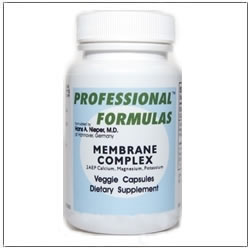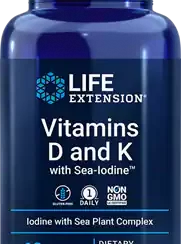Description
Size: 100 caps
Serving Size: 2 Capsules
Serving Size: 2 Capsules
Membrane Complex features 2-AEP (Amino Ethyl Phosphate) of three important minerals for human health: calcium, magnesium and potassium.
Membrane Complex is one of Dr. Hans Nieper’s formulas that supports the following systems:
1. Cardiovascular System
2. Lymphatic System
3. Epthelial (skin) System
4. Digestive System
5. Hormonal System
6. Immune System
7. Muscular System
8. Nervous System
9. Renal System
10. Respiratory System
11. Sensory System
12. Skeletal SystemCalcium (CA) is “the most abundant mineral in the body and combines with phosphorus to form calcium phosphate in the bones and teeth. It is essential for the normal functioning of nerves and muscles and plays a role in blood coagulation (as factor IV) and in many enzymatic processes.”Potassium (K) is “the chief cation in the intracellular fluid of muscle and other cells. Potassium ion is a strong electrolyte and it plays a significant role in the regulation of fluid volume and maintenance of the water-electrolyte balance.”Magnesium (MG) “is important for the activity of many enzymes, especially those involved in oxidative phosphorylation (i.e., electron transfer through the cytochrome system liberating free energy which is transformed into high-energy phosphate bonds.)
1. Cardiovascular System
2. Lymphatic System
3. Epthelial (skin) System
4. Digestive System
5. Hormonal System
6. Immune System
7. Muscular System
8. Nervous System
9. Renal System
10. Respiratory System
11. Sensory System
12. Skeletal SystemCalcium (CA) is “the most abundant mineral in the body and combines with phosphorus to form calcium phosphate in the bones and teeth. It is essential for the normal functioning of nerves and muscles and plays a role in blood coagulation (as factor IV) and in many enzymatic processes.”Potassium (K) is “the chief cation in the intracellular fluid of muscle and other cells. Potassium ion is a strong electrolyte and it plays a significant role in the regulation of fluid volume and maintenance of the water-electrolyte balance.”Magnesium (MG) “is important for the activity of many enzymes, especially those involved in oxidative phosphorylation (i.e., electron transfer through the cytochrome system liberating free energy which is transformed into high-energy phosphate bonds.)







Reviews
There are no reviews yet.